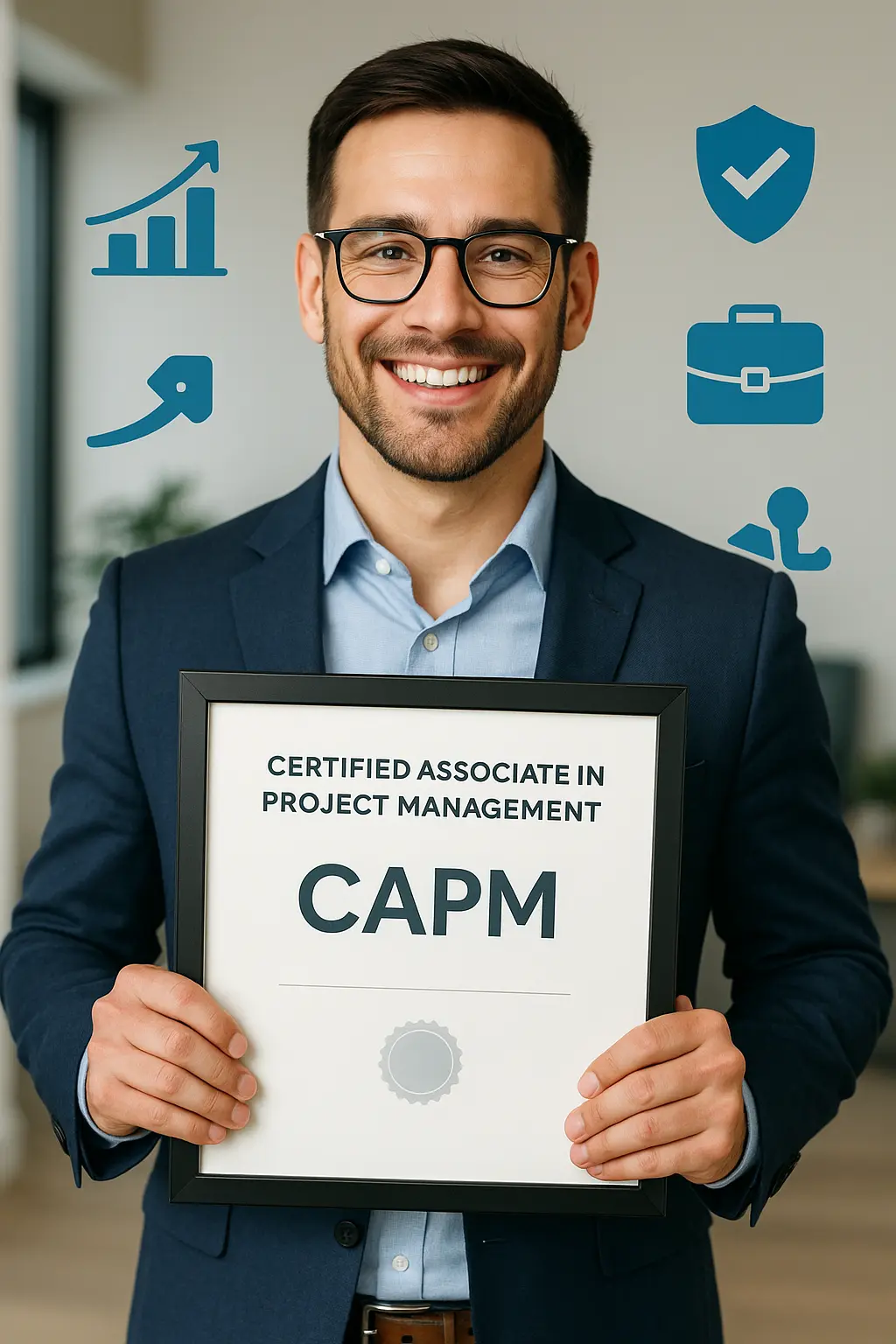What is CAPM Certification: A Guide to Getting Started, Studying, and Getting Certified
By: Ryan Malaluan, CAPM®; Editor: Geram Lompon; Reviewed by: Alvin Villanueva, PMP®
Did you know the
Having a certified associate in
This guide teaches you how to start your CAPM® certification journey. You’ll learn to study well and boost your chances of passing the exam.
Key Takeaways
- Understand the significance of CAPM certification for your career in
project management . - Learn how to prepare for the CAPM exam effectively.
- Discover the benefits of becoming a certified associate in
project management . - Gain insights into the
project management principles and methodologies. - Enhance your job prospects as an entry-level project manager.
What is CAPM Certification and Why It Matters
The CAPM certification is for those new to
The Certified Associate in
It’s great for learning the basics of
- Project integration management
- Scope management
- Time and cost management
- Quality management
- Resource management
The
While CAPM is designed for entry-level project managers or those new to the field, other certifications like PMP are aimed at more experienced people. The main differences are:
- Experience requirements: PMP candidates must have significant professional experience, while CAPM is accessible to those with little or no
project management background. - Exam content: PMP exams are harder and more scenario-based.
- Eligibility criteria: CAPM is easier to get into, with fewer requirements, making it ideal for entry-level project managers and other candidates looking to stand out in the job market, whether newcomers or experienced professionals seeking to differentiate themselves.
PMP certification is often pursued by established professionals with extensive backgrounds in
CAPM Certification Requirements and Eligibility
The
To earn the certification, candidates must meet specific requirements, such as education and training. These credentials validate your
Educational Prerequisites
To qualify for the CAPM certification, you need a secondary degree. This can be a high school diploma or a GED. An associate’s degree is also accepted as a qualifying credential. The PMI also recognizes a global equivalent, which refers to internationally recognized alternatives to traditional degrees. The PMI requires this basic education.
23 Hours of Project Management Education
You also need 23 hours of project management education. You must have completed
- PMI Authorized Training Partners
- Online courses
- Colleges and universities
Step-by-Step Application Process
You can apply for the CAPM certification after meeting the educational requirements and completing the
- Create a PMI account on the PMI website.
- Fill out the CAPM application form.
- Pay the exam fee.
- Submit your application for review.
Once your application is approved, you can schedule your CAPM exam. Follow the PMI’s requirements carefully to ensure a smooth certification journey.

Benefits of Earning Your CAPM Certification
The CAPM certification is more than just a piece of paper. It’s a key to unlock new doors in
It also plays a significant role in ongoing professional development, encouraging continuous learning and skill enhancement through training and education. It shows you know your stuff and are serious about growing your career.
With the growing demand for
Career Advancement Opportunities
Earning your CAPM certification can significantly elevate your career prospects. It sets you apart in a competitive job market and makes you a strong candidate for entry-level project management positions.
With CAPM on your resume, you demonstrate initiative and commitment to professional growth. This opens the door to promotions, new job roles, and greater responsibilities. It’s an investment in your future that can pay off in long-term career progression.
Salary Increase for CAPM Certified Professionals
CAPM-certified professionals generally earn more than those without certification. According to industry reports, the average salary for CAPM holders is consistently higher, reflecting employers’ value on certified skills.
The credential indicates you’re trained in PMI standards, which many companies seek. This recognition often translates into better job offers, salary negotiations, and annual raises, making CAPM a smart step for boosting your earning potential in
Industry Recognition and Credibility
The CAPM certification is globally recognized and respected across industries. It shows you’ve mastered essential
Employers and teams see CAPM as proof of your discipline and expertise. It enhances your professional image, giving you an edge in interviews and on-the-job responsibilities.
Addressing the Project Management Talent Gap
Becoming CAPM certified positions you as a solution to the global
Labor statistics show strong job growth in this field over the next decade. Your certification helps close this gap by proving you can contribute effectively. It also supports global workforce development through standardized knowledge and practical skills.

CAPM Exam Structure and Content
To pass the CAPM exam, you must know its content and structure. The CAPM certification exam is a crucial component of the certification process, evaluating your understanding of
The CAPM exam has 150 multiple-choice questions. You have 3 hours to finish them. The CAPM exam duration is three hours. This test assesses your understanding and ability to apply
Knowledge Areas Covered in the Exam
The CAPM exam covers many areas of
- Project Integration Management
- Project Scope Management
- Project Schedule Management
- Project Cost Management
- Project Quality Management
- Project Resource Management
- Project Communications Management
- Project Risk Management
- Project Procurement Management
- Project Stakeholder Management
PMBOK Guide and Its Importance
The PMBOK Guide is key to the CAPM exam. It offers a detailed framework for
It is important to keep up with CAPM exam format changes. The

Comprehensive CAPM Study Plan
A solid CAPM study plan is essential for exam success. Structure your preparation by setting clear goals and following a step-by-step approach. Consider enrolling in an in-person course for guided support, face-to-face interaction, and expert insights.
These classes often provide live feedback and help you stay accountable. A mix of structured learning and practical review sessions ensures you’re fully prepared for the CAPM exam day.
Study Resources and Materials
Choosing the right CAPM study materials is critical. PMI recommends using the PMBOK Guide as your foundational resource. Supplement it with CAPM prep courses, study guides, and online tools. Helpful resources include flashcards, discussion forums, and videos.
Look for study aids from PMI Authorized Training Partners to ensure quality and alignment with the latest exam content outline. Diversifying your materials strengthens your grasp of key
Creating an Effective Study Schedule
A well-organized study schedule keeps you focused and on track. Begin by assessing your available time and daily commitments. Break your sessions into manageable chunks, each targeting a specific topic. This avoids burnout and helps with retention.
Incorporate regular reviews and buffer time for revision. Include short breaks to recharge, and try using visual tools like calendars or apps to monitor progress and adjust your study plan as needed.
Practice Exams and Their Importance
Practice exams play a crucial role in effective CAPM exam prep. They not only help test your knowledge but also simulate the exam environment. This boosts confidence and reduces anxiety. Review the answers carefully to identify weak areas and refine your understanding.
Use exams from PMI Authorized Training Partners to ensure accuracy and alignment with the real test format. Regular practice sharpens your timing and problem-solving skills.
PMI Authorized Training Partners and Courses
PMI Authorized Training Partners provide CAPM courses that align with the latest standards and exam content. These courses are vetted for quality and offer structured lessons, practice questions, and expert-led instruction.
Enrolling in such a course ensures you’re studying relevant material. Look for official recognition to guarantee your course meets PMI guidelines. These programs often include extra resources like flashcards, sample exams, and personalized feedback for better exam readiness.

CAPM Certification Costs and ROI
Thinking about getting your CAPM certification? It’s important to know the costs involved. This investment includes different expenses. Knowing these costs helps you make a smart choice. The CAPM exam fee is a big part of the cost. PMI members pay $225, while non-members pay $300. Joining PMI can save money if you plan to get more certifications later.
APM certification can open doors to better jobs, higher pay, and more recognition in your field. Knowing the costs and benefits helps you decide if CAPM certification suits you.
There are also costs for study materials and courses. These can cost between $50 and $200. Courses, online or in-person, can add another $200 to $1,000 to your total.
To keep your CAPM certification, you need 15 PDUs every three years. There’s no direct cost for PDUs. But you might spend time and money on continuing education.
The initial costs of CAPM certification might seem high. But the long-term benefits are worth it. CAPM certification can open doors to better jobs, higher pay, and more recognition in your field. Knowing the costs and benefits helps you decide if CAPM certification suits you.
From CAPM to PMP: Your Career Path Forward
With CAPM under your belt, you’re ready to become a
Using CAPM as a Stepping Stone
Earning your Certified Associate in
CAPM equips you with a solid understanding of frameworks, terminology, and best practices based on the PMBOK® Guide. This foundation helps you perform more effectively in project environments, impress hiring managers, and qualify for more advanced roles.
Think of it as your launchpad—it proves your knowledge and sets you apart from other entry-level candidates. It’s the first big step toward long-term success in
Gaining Required Project Management Experience
To qualify for the PMP® certification, PMI requires candidates to have substantial hands-on project experience. You’ll need either 36 or 60 months of leading or directing project tasks, depending on your education level.
This experience must be properly documented—every hour counts, so diligently track your involvement. It’s not just about being on a project team; you must demonstrate leadership in initiating, planning, executing, or closing a project.
Whether you’re managing schedules, budgets, or stakeholder communication, these experiences build the skills necessary for the PMP. Treat every project as an opportunity to grow and log qualifying experience.
Transitioning to PMP Certification
Once you’ve met the experience requirement, you can apply for the
Once approved, the next big step is passing the PMP exam. You’ll need a structured study plan, ideally including the latest edition of the PMBOK® Guide, online courses, and plenty of practice exams.
Dedicate time to mastering concepts like earned value management, critical path method, and stakeholder engagement. The transition from CAPM to PMP isn’t just about a title—it marks your evolution into a project leader.
Other Advanced PMI Certifications to Consider
Beyond the PMP, PMI offers several advanced certifications tailored to specific
The PgMP® (Program Management Professional) or PfMP® (Portfolio Management Professional) certifications might be a better fit for those managing multiple projects and complex initiatives. Each credential helps deepen expertise and align career goals with specific organizational goals or industry demands.
As you grow professionally, these certifications can set you apart in leadership roles and high-stakes projects. Choose one that aligns with your passion, strengths, and vision for the future.

Wrapping Up: Taking the Next Step in Your Project Management Journey
You now see how CAPM certification boosts your
Think about how CAPM fits into your future plans. With CAPM, you can handle bigger projects and lead teams. Your journey in
Choosing CAPM certification means you’re looking ahead to a bright future. Start by looking for study materials, planning, and signing up for the exam. Your career in
References
Forbes Advisor. (n.d.). Best online
Forbes Advisor. (n.d.). PMP certification salary: How much can you make? Forbes. https://www.forbes.com/advisor/education/certifications/pmp-certification-salary/
Indeed. (n.d.). CAPM certification jobs: What you need to know. Indeed Career Guide. https://www.indeed.com/career-advice/finding-a-job/capm-certification-jobs
Project Management Institute. (n.d.). Certified Associate in

